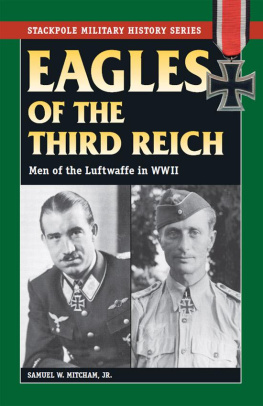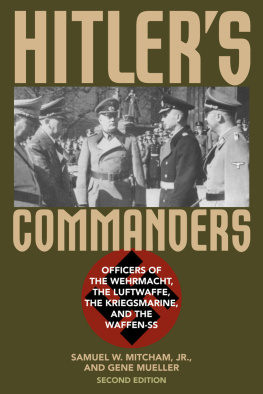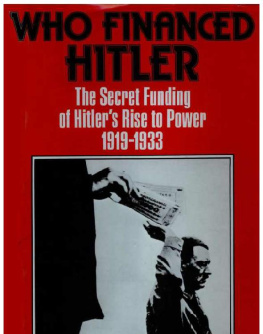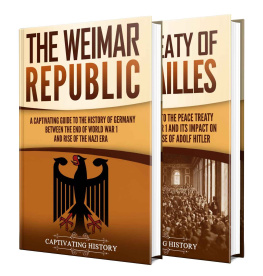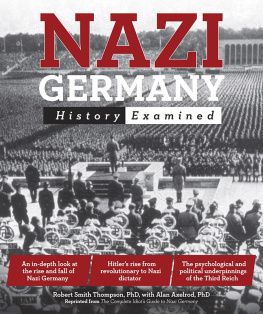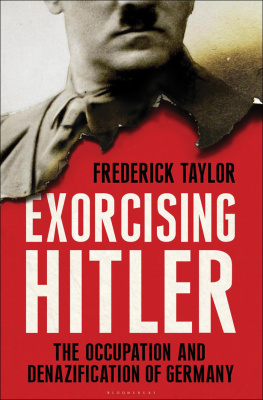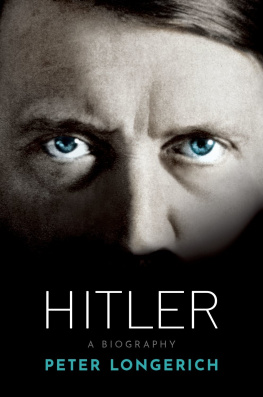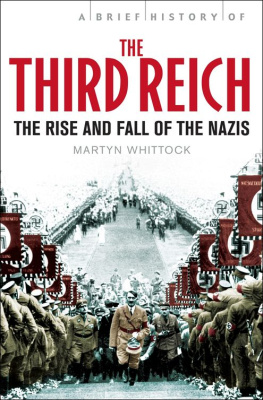SAMUEL W. MITCHAM, JR.







Contents
ix
xi
Tables
Introduction
During my travels and after my speeches, the most common question I am asked is why the Germans-a civilized and educated people-came to choose Adolf Hitler as their chancellor, unleashing upon the world one of the most barbaric and inhuman regimes in history. The purpose of this book is to answer that question.
Taken as a whole, it is a complex story. Hitler owed his rise to both external and internal factors. First of all, he was a great politician. This comment may horrify some Americans, many of whom mentally conceptualize the terms "greatness" and "goodness" as if they are somehow related. This is not necessarily true and certainly is not true in the case of Hitler. There have been (and are) great criminals and great villains. Hitler was unquestionably both, especially in terms of the enormity of his crimes. In fact, his memory is so repugnant to us that many are reluctant to ascribe to him any traits that might be construed as positive for fear of somehow being conceived as pro-Hitler or pro-Nazi. The truth, however, is that just as the devil has the power to assume pleasing forms so do some of his human allies, and Hitler certainly exhibited a touch of political genius in making himself appear pleasing to the average German voter. This was made all the easier by the relative mediocrity of his opponents, which brings up the second major point: the external factors.
Despite his undeniable political skill, Hitler would never have come to power in times that were in any way normal. Reasonably happy and prosperous people, regardless of nationality, do not elect extremists like Hitler to high office in normal times. But for Germany in the 1920s and early 1930s, times were anything but normal; they were desperate. Collectively, the Germans were like a drowning man, and a drowning man will take anybody's rope. Hitler offered them hope, and they grabbed his rope by the millions.
I once knew a German who was the type of man one would not mind having as a neighbor-just a good, solid, helpful, pleasant sort of fellow who was getting up in years and who was more overweight than I was-another mark in his favor. Certainly, he was not the type of monster who committed murder on such a massive scale in the 1940s. I was appalled when he told me, in a confidential manner, that he had voted for Hitler. After I expressed my shock, he became very thoughtful. He reminisced about being a young man lying in bed next to his wife at night, but neither of them could sleep since their children in the next room were crying because they had not had enough to eat. Then his eyes focused directly on mine. "Yes," he declared forcefully, "You're damn right I voted for Hitler. He offered us hope!"
This brings up the question, "Could it happen again?" Absolutely. It already has. In Cambodia alone, two to three million people were exterminated out of a population of eight million by the Khmer Rouge, and the world press hardly noticed. But one of the most sobering experiences I ever had was a visit to Russia after the collapse of the Soviet empire. I found the conditions almost identical to those that existed in the Weimar Republic as it tumbled toward its end. The purpose of this book, therefore, is not only to inform and entertain: it is also meant as a warning because it could happen again!
ACKNOWLEDGMENTS
I would like to acknowledge everyone who assisted me in the production of this book, including Waldo Dalstead, Gene Mueller, and Colonel John Angolia, who furnished insights and much needed information. I would also like to thank the staffs of the U.S. National Archives and the U.S. Army's Institute of Military History, U.S. Army War College, Carlisle Barracks, PA. Sincere gratitude is also extended to Ms. Melinda Matthews, director of the interlibrary loan department at Northeast Louisiana University, Monroe, LA, for her invaluable assistance in tracking down research material. Sandel Library is indeed fortunate to have this incredibly efficient and knowledgeable professional. Finally, the greatest thanks go to my wife and my hero, Donna Mitcham, who helped in ways too numerous to mention.
1
The Fall of the
Second Reich
The Second World War had its roots in the first, which began in 1914. By early 1918 Germany had overrun all or most of Belgium, Poland, Lithuania, Latvia, Estonia, and Romania. Russia had sued for peace; Italy was on the verge of defeat after General Otto von Below's victory at Caporetto (where 275,000 Italians were captured and another 100,000 deserted); and Imperial Germany's two most revered military leaders, Field Marshal Paul von Hindenburg and General Erich Ludendorff, were massing a million men for a final blow, aimed at knocking France-Germany's archenemy and strongest remaining opponent in numerical terms-out of the war.
Unfortunately for Imperial Germany, these facts concealed the true gravity of the situation. Germany was, in fact, on her last legs militarily. She had been diplomatically outmaneuvered almost constantly since young Kaiser Wilhelm II removed the brilliant Otto von Bismarck as chancellor of the empire on March 19, 1890. As a result of Wilhelm's ineptitude, the Second Reich went to war in 1914 with only the weakest allies: the Ottoman Empire (later Turkey), the Austro-Hungarian Empire, and eventually Bulgaria. On the other hand, by 1917 all of the world's major powers were arrayed against her. By 1918 the ships of the German High Seas Fleet had either been sunk or bottled up; her U-boat offensive had been defeated by the British convoy system; her allies were on the verge of collapse; and hunger, starvation, and war weariness had gripped the German people, who were unable to import food due to the British blockade. Already there were signs of civil unrest in the fatherland. Also, as a result of Germany's decision to adopt a policy of unrestricted submarine warfare, the United States had declared war on Germany on April 6, 1917. Germany, then, had only two possible ways out of her deteriorating and increasingly grim strategic position in early 1918: either quickly seek and negotiate the best peace treaty she could get or launch a major offensive and defeat France and Great Britain, before the fresh American troops arrived in Europe in strength. Characteristically General Erich Ludendorff, whom the Germans called the "National Commander" and who had been the virtual military dictator of the Reich since 1916, chose the latter course. He recalled some of his best formations from Russia, Italy, and the Balkans and assembled more than 3,500,000 men for the decisive campaign.



